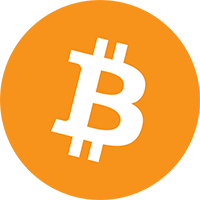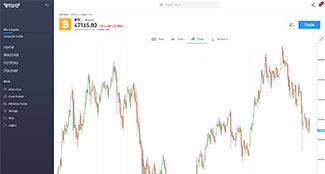


Unless you've been living inside a cave for 10 years, you've likely heard about Bitcoin (BTC). The world's most famous cryptocurrency is based on proof of work and is seen as a store of value for many investors.
A Bit About Bitcoin
Bitcoin is a cryptocurrency and an online payment system that was invented in 2009 by an unknown person or group known as Satoshi Nakamoto. It was designed to replace traditional currencies and overcome some of the shortcomings of other currencies like cash, with no transaction limits and lower fees.
At the time, there were no smartphones, and there wasn't widespread internet usage which would be one of the reasons technology allowed this virtual currency to exist.
Bitcoin is the world's most well-known cryptocurrency; easy to transact at a low cost & often seen as a digital store of value.CryptoLists.com
Like a digital form of gold, Bitcoins must be mined. But, how does Bitcoin mining Work? BTC mining is the method of verifying and adding transactions to the blockchain, which is a public record.
While computers are running BTC software to do this work, any processing power that views or executes a transaction will be rewarded with newly created BTCs. This incentive system helps keep the process secure by encouraging distributed verification among network participants rather than requiring trust in central management. The method of mining BTCs is purposefully designed to be resource-intensive and challenging for miners to find the same number of blocks every day.
To be considered valid, each block must have proof of work. When additional BTC nodes receive a block, they verify this proof of work. The hashcash proof-of-work function is used by Bitcoin.
Utility of Bitcoin?
It's the worlds most popular cryptocurrency, with the highest volume. BTC is also seen as an alternative store of value, so it can be good to have a little in your portfolio to hedge against inflation. Many people see it as a digital version of gold.
Bitcoin Price details
›› BTC tokenomics and social media
Advantages of Bitcoin
 + The worlds most reputable cryptocurrency and its flagship coin.
+ The worlds most reputable cryptocurrency and its flagship coin.+ Popular as store of value and the barometer of the whole industry.
+ Ease of Use with many applications enabling peer to peer retail transactions.
+ Privacy and Anonymity with much better security without the middlemen of traditional finance.
+ Cyclical patterns can make it easier than other coins to invest in, but this is not a guarantee at all.
Disadvantages
- Storage of BTC is not always safe without a hardware wallet - "not your keys, not your wallet".
- Very volatile, with retail investors not savvy to the cyclical nature of the coin's price actions thus far.
- Other coins perhaps have better utility, particularly Ethereum but also Solana.
Costs
▪ Rated at 9/10While Bitcoin transactions aren't necessarily the cheapest, it's mainly the time that represents the main negative factor. Many people prefer to use a scaling solution such as the Lightning network for faster and even cheaper transactions.
Bitcoin might be the most famous of the cryptos, but others have come along since that are a lot faster and cheaper in terms of day-to-day utility.
Reputation and Buzz
▪ Reputation rated at 10/10▪ Buzz rated at 10/10
It's the most well-known cryptocurrency in the world, so buzz is not an issue. The reputation is solid and Bitcoin's brand name is super strong. When Bitcoin moves, the market follows with very few exceptions, and none of them major names.
The market cap of BTC is the barometer of the entire cryptocurrency industry, and when all time highs are reached or eclipsed it's seen as a sign of a 'space' that's in rude health.
The buzz around Bitcoin tends to work in four-year cycles, timed by the bottom of each one. For example, December 2018 to December 2022, give or take a couple of weeks. 12-16 months after a low comes the Bitcoin halving event which tends to preceed the 'bull market proper' - where incredibly sharp rises are seen over the next year and a half (including a peak in interest among the general public, further driving speculative action). Following that, there's roughly a year of downward trend, ending with a cycle low. And, the beginning of a new cycle. It's not an exact science of course, however, Bitcoin experts tend to subscribe to this analytical framework.
Some of the developers involved in Bitcoin
▪ Rated at 8/10The logos below represent some of the developers who have been involved in Bitcoin. Check out the developer about page, by clicking the logo. There you can see what coins they have developed and at what exchanges, brokers and trading platforms their coins are available.

FAQ
What is the price estimates for Bitcoin?
Below are some of the most recent price predictions for BTC.
Date: 9/2, 2022: Research Firm: Fsinsight. Who? Tom Lee. Price target: $200 000.
Date: 25/5, 2022. Bank: JP Morgan. Price target: $48 640, 2023.
Date: 15/10, 2021. Fund: Ark Funds. Person: Cathie Wood. Price target: $500 000 in 2026.
Date: Beginning of 2022. Who: Bloomberg Intelligence. Price target: 100 000 USD for 2025.
Date: January, 2022. Who: Bill Miller. Price target: 100 000 by 2025.
How do you evaluate if you are buying BTC at the right time?
There is no way of knowing when to buy Bitcoin or when it’s price is at its peak or near a downfall. While you can follow some analysts and opinionated posts on the internet, the only reasonable way to determine when to buy is with real-time data from reliable sources such as BTC charts. You can check the current price and how it has changed in the last month, the current price and how it has changed in the last 24 hours (updated every 1 minute), or the number of Bitcoin purchase per day. Look for information from as many sources as possible to determine if the time is right for you to follow the general trend.
What is a Bitcoin maximalist?
True Bitcoin maximalists believe that BTC is the only digital asset that will be needed. They don't think you should waste your time with other cryptocurrencies, the so called alt coins such as ETH and BNB. It's worth to note that Bitcoin maximalism is not what Satoshi Nakamoto though when creating BTC. Bitcoin maximalists find that owning you don't need any other currency.
History of Bitcoin
2008 (18 August) - Bitcoin.org was registered.
2008 (31 October) - Whitepaper for Bitcoin was first shared with the public.
2009 (January) - The founder Satoshi Nakamoto released the open source code and started the Bitcoin Network.
2010 - The first known commercial transaction made with Bitcoin when two pizzas were bought for 10,000 BTC.
2021 - Bitcoin reaches an all time high of over 65,000 USD in November 2021.
2022 - The market 'bottom' is reach at year-end, following the aftermath of the FTX scandal.
2024 - Bitcoin reaches a new all time high in March (over 73,600 USD), over a month before the halving event, an unprecedented situtation that hasn't happened in past cycles.
Screenshots from Bitcoin
More sites where to buy/sell/trade Bitcoin
Below you can see some other platforms, exchanges and/or brokers where you can buy, sell or trade this coin. Click on the logo to read our review.This ad promotes virtual cryptocurrency investing within the EU (by eToro Europe Ltd. and eToro UK Ltd.) & USA (by eToro USA LLC); which is highly volatile, unregulated in most EU countries, no EU protections & not supervised by the EU regulatory framework. Investments are subject to market risk, including the loss of principal.
Never speculate with money which you can not afford to loose. Cryptocurrencies exhibit significant volatility and remain largely unregulated within numerous European Union nations. They are not covered by European Union protections and do not fall under the purview of the EU's regulatory framework. Please be aware that investments in this sector are prone to market risks, which may include the total loss of the invested principal.
Remember to never risk money that you can not afford to loose. Crypto currencies is highly volatile, unregulated in most EU countries, no EU protections & not supervised by the EU regulatory framework. Investments are subject to market risk, including the loss of principal.










































 Bitcoin breaches 100k USD barrier - to the moon?
Bitcoin breaches 100k USD barrier - to the moon? Transfer BTC faster than ever on Bet Panda casino
Transfer BTC faster than ever on Bet Panda casino Start off your Monday with a 1 BTC bonus at Cryptorino
Start off your Monday with a 1 BTC bonus at Cryptorino Two no-KYC casinos with bountiful BTC bonuses!
Two no-KYC casinos with bountiful BTC bonuses! Four stage 100 mBTC bonus on Power Up casino
Four stage 100 mBTC bonus on Power Up casino



























